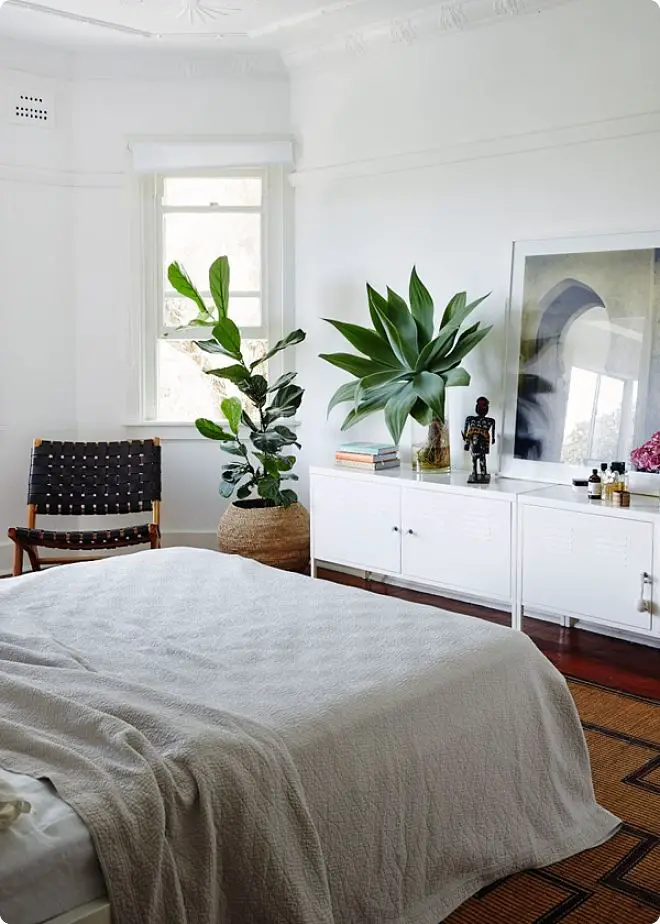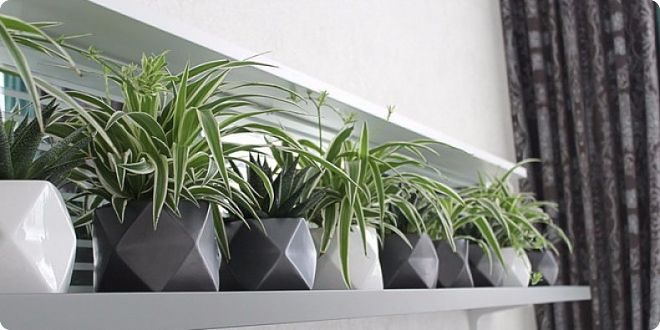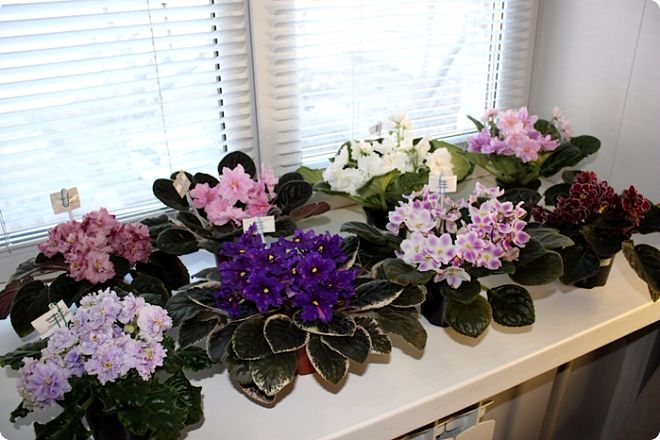Indoor Plants and Flowers for the bedroom can serve as an excellent addition and decoration, fill the atmosphere of unique warmth and comfort. Before choosing which plants to place in your room, it is important to know exactly how they affect human health and energy. Not every flower is suitable for placement in the bedroom and will have a beneficial effect. What are the best feng shui plants for bedroom and what flowers can be kept in the bedroom, and which ones it is better to refuse, we will consider them in more detail?

Benefits and Harms of indoor plants for human health
Plants for the bedroom have a number of special requirements. They should not only enrich the room with oxygen, please the eyes with their appearance, but also bring certain energy.
A lot of houseplants that we are familiar with are nothing more than the fruit of a selection of samples brought from all over the world during times of great geographical discoveries.
The widely known and beloved “money tree” in wildlife has a height of up to four meters. Despite the work done on the size, and the ability to bloom and smell all year round, the plants have not lost their protective ability to release poisons and toxins.
The more interesting and exotic the flower, the more dangerous its influence. Some specimens are capable of carrying deadly harm. These are quite rare plants, but it is advisable to remember a list of them:
- Fatsia is a cute and green bush or tree with bright green leaves that can lead to disorders of the nervous system.
- An ornamental tree called poliscias is irritating when the sap gets on the skin.
- Say goodbye to a plant called alocasia or arma as it has very significant levels of toxins.
- A tuber with a large leaf and arizema inflorescence can cause burns on the skin and harm the eyes.
Most indoor plants with toxins are dangerous if they come into direct contact (if you transplant without gloves) or if eaten (pets and children can taste the flowers well).
Plants that are quite dangerous at certain dosages include: aloe, dieffenbachia, monstera, azalea, nightshade, euphorbia, anthurium, croton, spathiphyllum, asparagus.
If such specimens are in your home, take care to limit the access of children and pets to them.
Some dangerous plants can be of great benefit in parallel:
- to enrich the room with oxygen, monstera and anthurium are used;
- rosemary, chrysanthemums, chlorophytum, aloe have antibacterial and medicinal properties;
- asparagus is used to absorb heavy metal microparticles;
- cyperus and abutilone are used to increase air humidity;
- geranium is used to disinfect, deodorize and even relieve headaches.
Rose, dwarf pomegranate and herbs are useful and safe for the home. Do not deny yourself the desire to create a small and useful garden in the atmosphere of the apartment, which will give you not only external pleasure from contemplation, but also the benefits of vitamins and fresh aroma.
Check out Best Aromatic Indoor Plants.
Basic tips for growing flowers and plants in the bedroom
Indoor flowers for the bedroom require some care and respect.
To make the process of adaptation of a new plant in the house as easy as possible, you should open and inspect, remove broken leaves, flowers, and in some cases, make a transplant and use feng shui techniques.
Dirt and dust from the petals should be removed with a cotton swab. Water the soil if it is dry. Do not put the flower on the windowsill right away. It is best to avoid direct sunlight for the first week.
For plants that love ultraviolet light in winter, it is better to get a special “flora” lamp and from time to time let them enjoy a sufficient level of ultraviolet rays.
5 best feng shui plants for bedroom
If you decide to make the room green, choose favorable flowers for the bedroom. Avoid strong-smelling plants. Prolonged stay in a room filled with fragrances will cause headaches. We have the best feng shui plants for bedrooms.
Consider the level of lighting in the room and the requirements of the plants for its availability. Flowers, as well as accessories, should be selected taking into account the style of the room.
If you plan to fill the room with several plants at once, ask how compatible they are and whether they can exist close to each other.
The most useful plants for the bedroom are considered to be: violet, geranium, aloe, camellia, dracaena, laurel, chlorophytum, begonia.
See also Best Low Maintenance Plants For Bedroom.
Chlorophytum
This small and discreet color is very useful. It not only fills the space with oxygen but also cleans the air from harmful compounds. To clear ten square meters of harmful impurities from the area, only three flowers are enough. In addition, it humidifies the air.

Aloe
The oldest doctor in the home pharmacy. That only is not treated with the juice of this flower. In addition, it releases a huge amount of oxygen and removes toxins from the air.
It has wound healing, disinfecting and many more therapeutic effects.
This flower is like a small potted pharmacy. He will always save you from a runny nose and heal a broken knee.
Geranium
This delicate flowering plant fights staphylococcus and streptococcus fungi, relieves headaches, helps lower blood pressure and strengthens the immune system and purifies the air. Insects do not like him very much.
Violet
Houseplants that bloom look very interesting for the bedroom. One of the best options for such a flower is a violet.

Its effect on hosts depends on the color. For an excited nervous system, choose white flowers.
Purple plants can make the atmosphere more welcoming and help establish contact.
Red and pink inflorescences can convey feelings of satisfaction and give wings.
Begonia
Begonia flowers can protect against diseases and help create a favorable atmosphere. Such plants are very favorable for the elderly.
see also Shade Loving House Plants.
What plant is bad for feng shui bedroom?
You cannot keep flowers in the bedroom that negatively affect your health and nervous state. Avoid strong-smelling plants. Their scent can be stressful and contribute to headaches.
Orchid
The orchid in the bedroom is not at all as harmless as it might seem. Despite the visual appeal, the presence of these flowers in the bedroom causes anxiety has a bad effect on sleep and emotional state.
Ficus
Ficus in the bedroom causes quite conflicting moods. According to ancient prejudices, this flower was believed to cause discord in the house. Others consider him a family talisman.
Ficus is a reliable oxygen filter. Certain medicinal properties are inherent in it.
Where should feng shui plants be placed in bedroom?
Plants for the bedroom can be chosen based on Feng Shui treatises. For those who love live plants, it is recommended to use only certain species and in strict accordance with a number of conditions. It is customary to stir no more than four plants.
For example, bamboo shoots planted by a pair in one pot will help bring harmony back to the family.
A lonely person is advised to plant flowering plants and place them in the love sector.
The teaching also gives recommendations on what kind of flowers you can put in the bedroom.
According to the treatises, the orchid brings tenderness and understanding to married life. However, it is recommended to place it in the workspace.
Placing peonies in the bedroom is advised for success in the love and the financial sphere. They will help you find love and keep the relationship on fire.
The use of artificial flowers is undesirable. They have a bad effect on vital energy and can lead to fading feelings.
When choosing flowers for your bedroom, pay attention to their effect on the body, psychological state, and external qualities discussed in feng shui techniques. It is also important that the plants fit harmoniously into the stylistic solutions of your room.